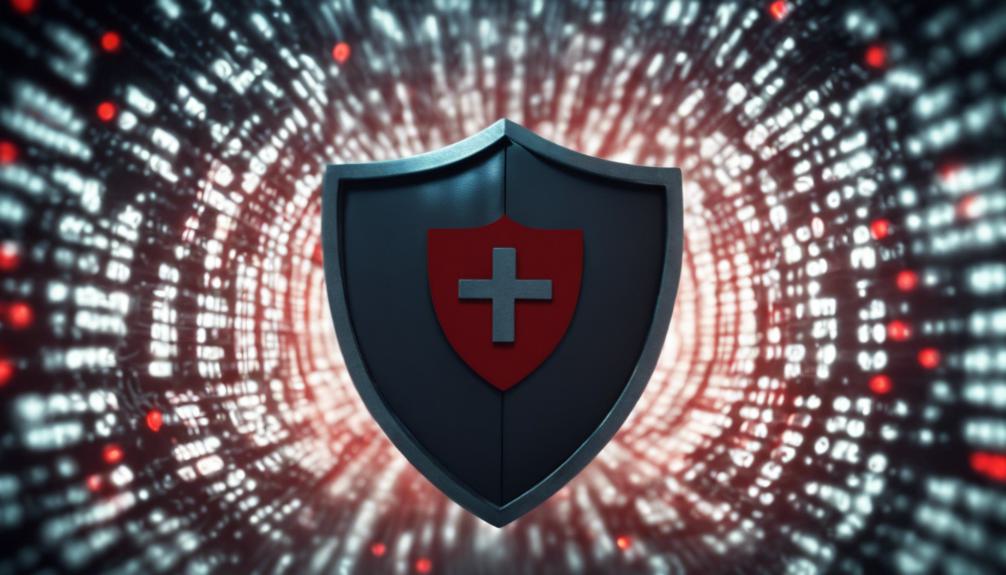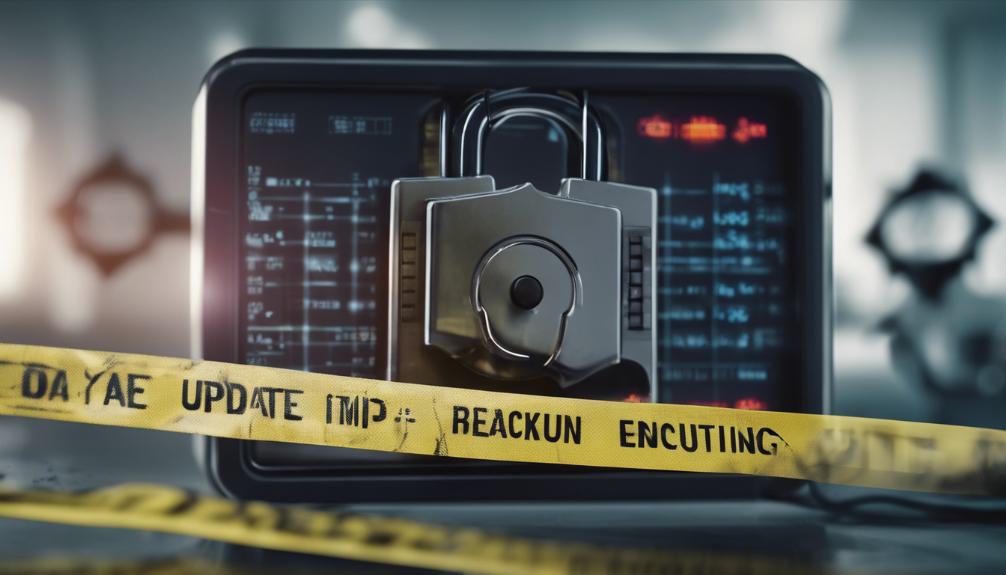Ardent Health Cyberattack Risks Thousands
In an era where digital infrastructure is as vital as the physical premises of a healthcare facility, the recent cyberattack on Ardent Health Services sends a stark warning about the fragility of our data protection systems. With thousands of patients and employees potentially at risk of identity theft and fraud, this incident not only disrupts the immediate delivery of healthcare services but also poses long-term consequences for data security and trust in healthcare providers. As we unpack the ramifications of this breach, one must ponder the broader implications for cybersecurity measures within the healthcare sector and the steps necessary to safeguard sensitive information against increasingly sophisticated threats.
Key Takeaways
- Thousands at risk after Ardent Health Services faced a ransomware attack, affecting hospitals in Oklahoma, New Mexico, and Texas.
- Sensitive data, including Social Security numbers and medical records, were compromised, heightening identity theft risks.
- Patients and employees are urged to be vigilant and consider legal action to protect against fraud and identity theft.
- Ardent Health is notifying affected individuals and a data breach lawsuit is currently open for new clients.
Cyberattack Overview

On Thanksgiving Day, November 23rd, Ardent Health Services fell victim to a ransomware attack that compromised its network across Oklahoma, New Mexico, and Texas, disrupting crucial healthcare services and placing sensitive patient and employee data at risk. This cyberattack underscores the growing vulnerability of healthcare systems to sophisticated digital threats, raising concerns about the protection of personal information in an increasingly interconnected world. The incident prompted immediate action to safeguard against further unauthorized access, with a focus on restoring services and maintaining the trust of those they serve. In an era where digital health records are the backbone of patient care, the breach at Ardent Health Services serves as a critical reminder of the importance of robust cybersecurity measures to protect the well-being of communities and the integrity of healthcare provision.
Affected Facilities

Several Ardent Health Services facilities, including 30 hospitals and over 200 healthcare sites across Oklahoma, New Mexico, and Texas, were greatly impacted by the recent cyberattack. This widespread disruption has significantly affected the communities these facilities serve, underscoring the critical role they play in ensuring the health and well-being of thousands. The attack not only endangered the operational capabilities of these healthcare providers but also posed a direct threat to the continuity of care for many patients. Efforts have been mobilized to address the immediate challenges posed by this cyberattack, focusing on restoring services and safeguarding patient information. The commitment of healthcare professionals to overcoming this adversity demonstrates their dedication to serving their communities, even in the face of unprecedented challenges.
Ransomware Impact

Given the scale of Ardent Health Services' operations, the ransomware attack has had profound implications on the availability and reliability of critical healthcare services. With over 30 hospitals and 200 healthcare facilities across the U.S. compromised, the disruption extends far beyond mere data theft; it strikes at the heart of patient care and safety. The incapacitation of clinical programs and essential operational software, such as Epic Systems, has not only jeopardized the integrity of patient data but also hindered healthcare professionals' ability to serve those in need effectively. This situation underscores the vulnerability of healthcare institutions to cyber threats and the paramount importance of robust cybersecurity measures to safeguard the well-being of patients and the efficacy of healthcare delivery.
Patient Diversion

In response to the cyberattack, Ardent Health Services was compelled to divert patients from emergency rooms, a move underscoring the immediate impact on patient care and hospital operations. This decision, though difficult, was made with the welfare of patients in paramount consideration, ensuring that individuals in need of emergency medical attention could receive the highest possible standard of care under the circumstances. The diversion of patients highlights the profound effects of cyberattacks on healthcare infrastructure, emphasizing the importance of robust cyber resilience measures. For those committed to serving others, this situation serves as a stark reminder of the vulnerability of healthcare systems to digital threats and the critical need for preparedness and swift, compassionate response strategies to safeguard patient well-being in times of crisis.
Identity Theft Risk

Moving from the immediate operational impacts of the cyberattack, it is equally important to address the significant risk of identity theft facing patients and employees due to compromised personal information. In the wake of this incident, the potential for unauthorized access to sensitive data such as Social Security numbers, names, and medical records exposes individuals to the risk of fraudulent activities and unauthorized purchases. It is crucial for those affected to remain vigilant and proactive in safeguarding their personal information. Implementing measures such as monitoring credit reports, setting up fraud alerts, and considering legal counsel can serve as essential steps in protecting oneself from the detrimental effects of identity theft. This situation underscores the need for continuous vigilance and proactive measures to secure personal data against unauthorized access.
Attack Details

The cyberattack on Ardent Health Services, identified as a ransomware incident, occurred on Thanksgiving Day, November 23rd, profoundly disrupting the network's operations and compromising sensitive information. The attack's malicious intent was unmistakably clear as it shut down critical computerized services, including clinical programs and Epic Systems, across multiple states. This not only diverted patients from emergency rooms but also placed patient and employee identities at significant risk of identity theft. The hackers gained unauthorized access to a wealth of sensitive data, including names, Social Security numbers, and medical records. This breach of privacy has far-reaching implications for those affected, emphasizing the need for vigilance and protective measures to safeguard personal information in the healthcare sector.
Notification Process

Understanding the gravity of the cyberattack's impact on personal data, Ardent Health Services initiated the notification process to inform affected individuals of the breach starting January 22, 2024. Recognizing the profound responsibility to those who entrust them with their health and personal information, the organization acted promptly. Letters of notification were meticulously prepared and dispatched, offering clear explanations of what occurred, the specific types of data compromised, and the immediate steps Ardent Health is taking to address the situation. This transparent communication reflects Ardent Health's commitment to integrity and the well-being of its patients and employees. It underscores the organization's dedication to mitigating potential harm and fostering a culture of trust and accountability in the wake of such incidents.
Protecting Personal Information

Safeguarding personal information has become essential in the wake of the Ardent Health Services cyberattack, highlighting the need for stringent security measures and vigilance. In an era where digital threats loom large, especially in the healthcare sector, the responsibility to protect sensitive data falls on both the institutions that hold it and the individuals it pertains to. For those passionate about serving others, understanding the importance of data security is paramount. It involves not just adhering to best practices in digital hygiene, such as using strong, unique passwords and being cautious about sharing personal information online but also advocating for organizations to implement robust cybersecurity measures. Empowering oneself and others with knowledge on preventing data breaches is a pivotal step towards fostering a safer digital environment for all.
Legal Recourse Options

Recognizing the importance of data security, individuals affected by breaches such as the Ardent Health Services cyberattack have various legal recourse options available to protect their rights and seek compensation. Victims may consider filing individual lawsuits or joining a class action suit against entities failing to safeguard sensitive information. Engaging with attorneys specializing in data breach cases can provide guidance on the complexities of legal claims and potential compensation for damages suffered. This legal support is vital for maneuvering the aftermath of a cyberattack, ensuring affected parties can hold negligent entities accountable while recovering from financial and emotional distress. It's imperative for those impacted to explore these legal avenues promptly to safeguard their interests and contribute to higher standards of data protection in the healthcare industry.
Proactive Safety Steps

In the wake of the Ardent Health Services cyberattack, it is imperative for individuals to take proactive safety steps to protect their personal information from potential misuse. The breach underscores the heightened risks that patients and employees face in an era where digital healthcare data can easily become a target for malicious actors. To serve oneself and the community effectively, adopting vigilant practices is essential. This includes monitoring bank and medical statements for unauthorized transactions, considering credit freezes or fraud alerts, and staying informed about the latest cybersecurity measures. Additionally, enhancing digital literacy to recognize phishing attempts and securing personal networks can greatly reduce the risk of further exploitation. By taking these steps, individuals can contribute to a culture of cybersecurity awareness and resilience, safeguarding not only their information but also that of others who rely on secure healthcare services.
Case Status Update

Following the outlined proactive safety steps, it's important to provide an update on the legal proceedings concerning the Ardent Health Services data breach case. The case remains open, with legal representatives diligently working to safeguard the rights and interests of those affected. Individuals who have suffered due to this breach are encouraged to join the ongoing lawsuit, with no associated costs for participation. This collective action aims to secure compensation for damages experienced by victims, emphasizing the importance of accountability and the pursuit of justice in such significant privacy violations. The legal team continues to advocate for those impacted, making sure that every individual receives the support and guidance needed during this challenging time.
Exploring Additional Resources

Victims of the Ardent Health Services cyberattack are advised to explore additional resources for support and information on protecting their identities and legal rights. In response to the increasing threat of cyberattacks, various organizations and online platforms offer guidance on data breach response, identity theft prevention, and legal recourse. Affected individuals should consider engaging with consumer protection agencies, cybersecurity experts, and legal advisors specializing in data breach cases. These resources can provide essential advice on monitoring for fraudulent activity, securing personal information, and understanding one's rights to compensation. By leveraging such support, victims can navigate the aftermath of the cyberattack more effectively, ensuring they take the necessary steps to safeguard their identity and seek justice against those responsible for the breach.
Frequently Asked Questions
How Can Individuals Specifically Determine if Their Data Was Compromised in the Ardent Health Services Cyberattack?**
To ascertain if one's data was compromised in the cyberattack, individuals should first check for any notification from Ardent Health Services, as they commenced sending letters to affected parties on January 22, 2024. Additionally, monitoring personal financial statements and credit reports for unusual activities can indicate unauthorized use of personal information. Engaging with identity protection services may also offer insights into whether one's data has been compromised in this specific breach.
What Are the Long-Term Implications for Patients' Medical Care and Records After the Ransomware Attack on Ardent Health Services?**
The ransomware attack on Ardent Health Services portends significant, long-term implications for patient care and record integrity. To begin with, the integrity of medical records may be compromised, potentially leading to inaccuracies in patient histories and treatments. Additionally, the continuity of care could be disrupted, as transferring and accessing medical information becomes more challenging. Finally, the breach raises concerns over the confidentiality of patient information, potentially eroding trust between healthcare providers and patients.
Are There Specific Cybersecurity Measures That Ardent Health Services Is Implementing Post-Attack to Prevent Future Incidents?**
In response to the recent cybersecurity incident, Ardent Health Services is actively enhancing its digital security infrastructure to mitigate future risks. Implementing advanced protective measures, including stronger network defenses and employee training on cybersecurity best practices, is paramount. These steps aim to safeguard sensitive patient and employee data against unauthorized access, thereby reinforcing trust and ensuring the continuity of care. Further details on specific security upgrades remain under review by the organization.
How Can Affected Individuals Monitor Their Information on the Dark Web Following the Ardent Health Services Data Breach?**
Individuals concerned about their personal information being compromised in the data breach should consider monitoring their digital footprint on the dark web. Specialized cybersecurity services offer dark web scanning to detect unauthorized use of sensitive data. Regularly reviewing bank statements, credit reports, and setting up fraud alerts with credit bureaus are also prudent measures. Proactive engagement with these practices can mitigate the risk of identity theft and financial fraud following such a breach.
What Responsibilities Do Healthcare Providers Have in Ensuring the Digital Security of Their Patients' Information, and How Did Ardent Health Services Address These Post-Attack?**
Healthcare providers bear the important responsibility of safeguarding patient data, a task that necessitates robust digital security measures. In response to an unfortunate cybersecurity incident, Ardent Health Services undertook significant steps to fortify its defenses, including network enhancements and rigorous monitoring to prevent future breaches. Actions such as these underscore the commitment to patient safety and data protection, serving as a proof to the organization's dedication to its community's well-being.
Conclusion
In conclusion, the cyber onslaught on Ardent Health Services, reminiscent of the proverbial bolt from the blue, has laid bare the fragility of our digital fortresses, particularly in the healthcare sector. This breach not only endangers personal identities but also erodes the sanctity of patient confidentiality. As the specter of identity theft looms large, the imperative for fortified cybersecurity defenses and informed vigilance becomes undeniable. This incident serves as a stark reminder of the relentless vigilance required to protect our most sensitive information from the shadows that lurk in the digital domain.

This post has been generated by AI and was not reviewed by editors. This is Not legal advice. Please consult with an attorney.